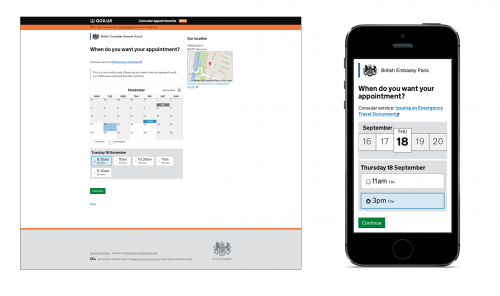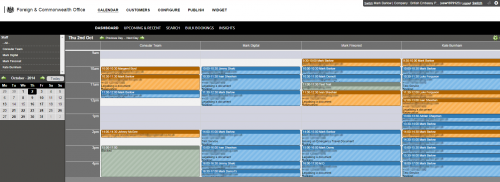30th January 2015 London, UK
Consular appointments – our approach to development and training
How the appointments service was developed, the teams involved, and the first training iteration
While developing our consular appointments service through alpha to beta, we’ve worked closely with our partner BookingBug to customise their Software-as-a-Service offering to our needs – both user needs and organisational needs.
As the development was not in-house good communication was of paramount importance, so we have had a minimum of one face-to-face meeting and one telephone catchup per week, as well as regular updates through Jira tickets and ad hoc conversations and emails. While not quite the same as attending an agile project’s daily stand-ups in person, we managed to stay sufficiently in touch and avoid the misunderstandings that can happen if you rely too much on written documentation alone. We worked in an iterative Kanban manner at first while completing the lion’s share of the work, and have switched more recently to folding our work into BookingBug’s multi-client 2 week scrum sprints.
Having a flexible partner has been critical, and we enjoyed a fruitful meeting of minds regarding loops of iteration, feedback and further iteration. Two areas in particular where we have been through several iterations are the customer booking journey – especially the booking forms we ask users to fill in – and the hierarchy and permissions for the admin interface. The latter is a crucial area which determines which elements of the service are shared and standardised globally, and which are configurable and localised at each post. For example, the names of services and the email templates are global, but the schedules and availability of those services is set at a local level.


We also held weekly internal meetings with key stakeholders to bring all the strands of work together. These meetings included representatives from the consular teams, the global contact centres who handle first line phone support, our training lead and the policy leads for transactional services. Alongside the development work, the members of this project team were working on content guidance, agreeing policy, planning assisted digital efforts, designing training and completing global audits of services and settings which fed into the creation of each individual account. In keeping with FCO traditions, we also put our collective brainpower to the pressing matter of coming up with an acronym to (conf)use internally. And so “CABS” was born, for our Consular Appointment Booking Service. Something of a coincidence, given I worked on a taxi app before joining the FCO.
Training
As the service developed, we started running training sessions for consular staff at the first posts slated to launch the public beta. We also trained the contact centre staff who will be providing the assisted digital service. As a first step my colleague Kate, whose focus is on digital training and upskilling, put together training guides which we could run through on conference calls, but which also had step by step screenshots for staff to follow once logged in to their accounts. We have since been developing this into separate guides for different users, and for different stages as posts move from initial set up to going live.
After delivering some initial training, I had a chance to see how it had worked in practise by visiting the consular team in Madrid as they prepared to go live on the pilot. This was also a good occasion for some more user feedback – I’ll talk about how it went and what we learnt in my next post.
Follow Mark at @markbarlow